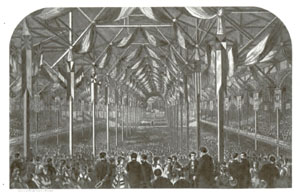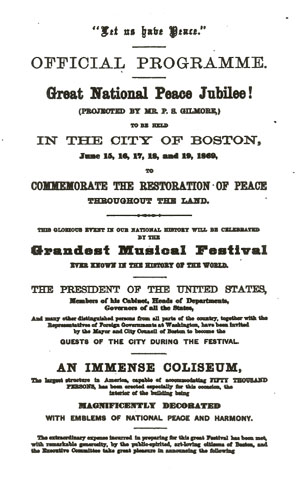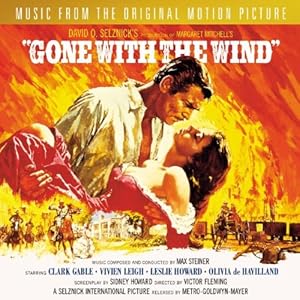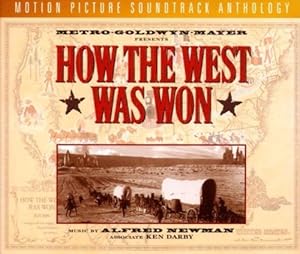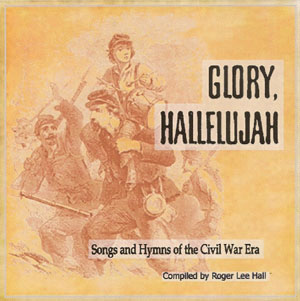
"When Johnny Comes Marching Home"
A Civil War Song Marches On!
(150th anniversary tribute)
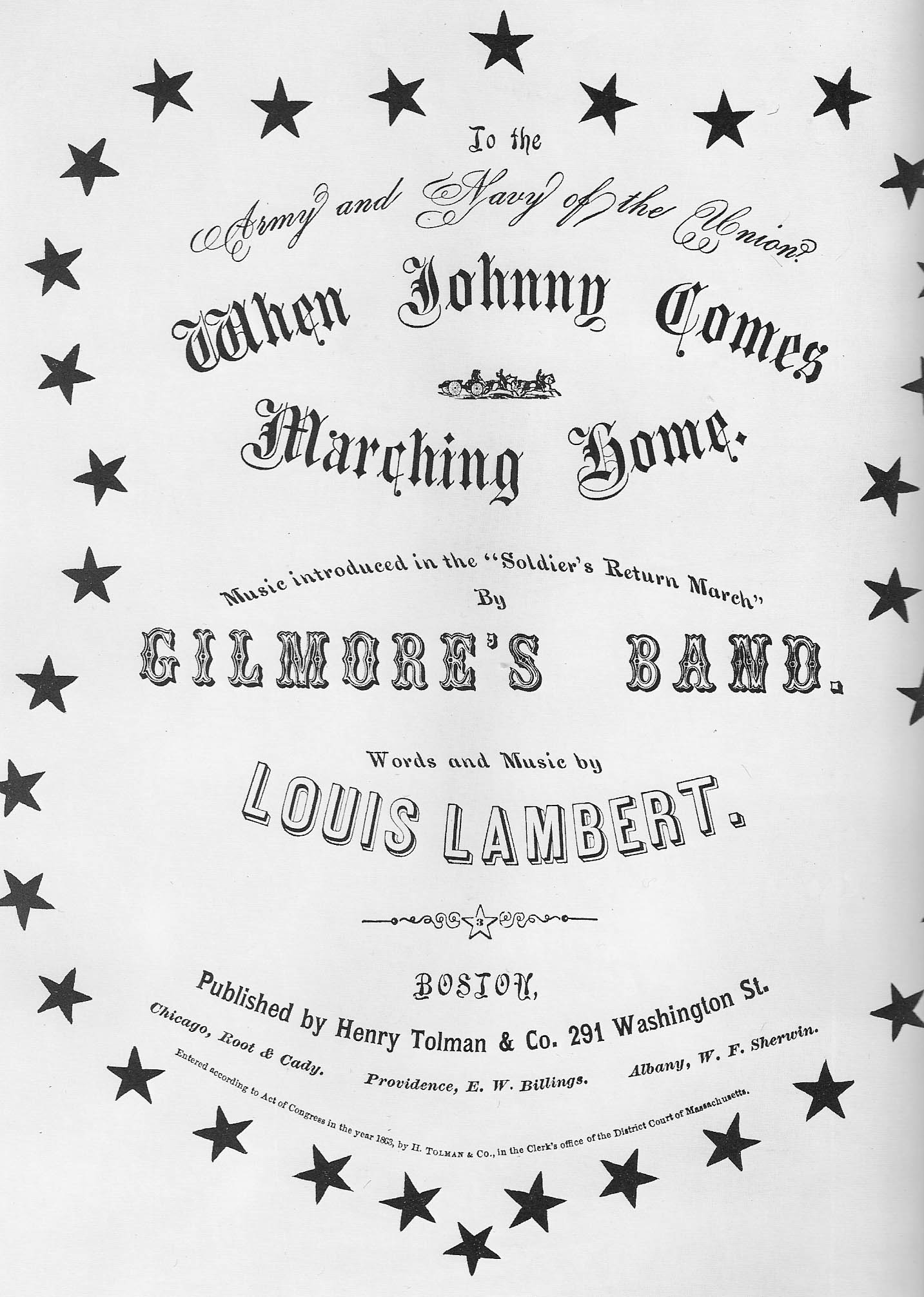
One of the best remembered songs from the Civil War has had numerous claims to its origin. Some people today might be unaware that the song was composed during the Civil War since it has been sung during other wars, including World War I and II, and is still played or sung today.
The reference on the above sheet music cover of the song being played in the “Soldier’s Return March” meant it was probably introduced within that music. It was a common practice then to have different melodies included in a march, especially the patriotic ones.
The original melody has been identified as Irish, Negro (Afro-American), Scottish, and English. None of these claims appear to be correct though some still hold on to their theories. What makes the issue even cloudier is the composer of this well-known tune was evasive.
On the sheet music, copyrighted on September 26, 1863 and published in Boston, the words and music are credited to Louis Lambert. It is not known why the composer chose this name instead of his own name unless he wanted to conceal his identity for fear of ridicule.
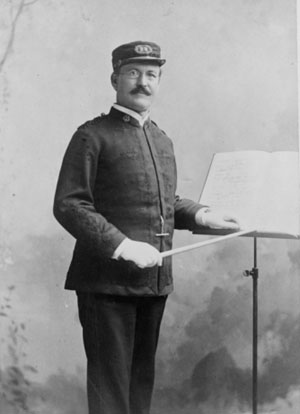
The composer’s real name for the song was Patrick Sarsfield Gilmore.
He was born in 1829 in Balygar, County Galway, Ireland and he came to Boston in 1849. Eventually he became known as the most famous band director of his time, and he directed various ensembles and toured extensively up until his death in St. Louis in 1892.
Though he was known as a bandmaster, Gilmore also composed a small number of songs and marches. But only one of his compositions remains popular today: "When Johnny Comes Marching Home."
James J. Fuld claims that the melody to the song was published earlier in July of 1863 under the title, “Johnny Fill Up The Bowl,” and it was not credited to Gilmore. The question is – did he actually "borrow" the earlier song melody or is it just a coincidence? No conclusive evidence has yet been found that gives credit to someone other than Gilmore.
Frank J. Cipolla described Patrick Gilmore as “an extremely energetic and enthusiastic man who constantly looked to the future with ever greater musical aspirations, he made his reputation as a promoter par excellence and became a character in the same mould as his early employer, P.T. Barnum." Cipolla also calls Gilmore "a visionary, dreamer, astute businessman, and slick operator."
Irwin Silber who wrote that "Gilmore himself had, on occasion, stated that he had learned the tune from an unidentified Negro singer and that it was a traditional Negro air." Silber continues that "the most casual listener would contradict this highly astonishing statement. And then he adds with tongue-in-cheek, "As one critic put it, the Negro's name may have been Pat Reilly."
Silber also discredits the claim that Gilmore's tune came from an Irish song, "Johnny I Hardly Knew Ye," since that song was written after the Civil War, and he further adds, "Gilmore's claim should be acknowledged."
So it appears he did in fact write “When Johnny Comes Marching Home” and it was published in 1863 by Henry Tolman & Co., 291 Washington St, Boston.
Richard Jackson called Gilmore’s song,
“one of the strongest and most unusual of the period. Its form is not that of the conventional verse section followed by a refrain; it is constructed as a series of statements by a solo voice with responses by a chorus, and the pattern of these statements and responses is slightly different in the last two verses than the first two.”
Jackson also states that this song is “one of relatively few songs in a minor key to achieve and maintain wide popularity.”
Four years after the end of the Civil War, a so-called "monster concert" was held in Boston. It was organized by Patrick Gilmore and officially called the Great National Peace Jubilee.
He was able to convince Boston businessmen that this massive music festival would be successful, and it was and actually made a profit. Gilmore received a hefty amount of money for his effort.
The week-long event in 1869 was held in a 500 foot long specially constructed building which seated 50,000 people. It featured music performed by a huge volunteer chorus made up of 10,404 singers from choral groups all over New England and as far away as Cleveland, Ohio. The concerts featured over 50 soloists and an enormous orchestra and military band numbering 1,011 musicians. To prove they were there, Gilmore lists all of their names at the back of the history of the event he published two years later. The Peace Jubilee slogan was "Let us have Peace" and was organized to commemorate the end of the Civil War. One might expect to have lots of popular Civil War songs from North and South including Gilmore's song about "Johnny." But that was not the case.
The Peace Jubilee featured mostly Eueopean classical music by Handel, Mozart, Verdi, and others. There were also a few pre-Civil War patriotic songs like, "The Star Spangled Banner" and "My Country 'Tis of Thee." Gilmore wisely decided not to arouse any heated reactions by performing such songs as "Dixie" or "Battle Hymn of the Republic." Gilmore did compose a new song for the National Peace Jubilee, "God Save Our Union." This is the first verse:
God save our Union!
God save our land!
From all disunion
Keep heart and hand:
True to our nation,
True unto Thee,
Lord of Creation,
Teach us to be.
Though it wasn't performed in the National Peace Jubilee, Gilmore's “When Johnny Comes Marching Home" remained popular for many years after the Civil War. But the composer’s name was still hidden for quite some time.
In 1909, a popular music collection titled, Heart Songs, was published in Boston, compiled from 20,000 people sending in their favorite songs. “When Johnny Comes Marching Home” was included in the collection but it was still credited to the Louis Lambert pseudonym for Gilmore.
Today, the bandmaster is usually identified by his real name for the song and it has been used for more than military events.
For instance, Gilmore's song has been used as background music in big budget movies, like Max Steiner’s arrangement in the classic Civil War era film,
GONE WITH THE WIND in 1939.
Also Ken Darby’s vocal setting of the song in HOW THE WEST WAS WON in 1963.
- The song is still sung today since the words express not only the Civil War years, but also a welcoming return for the troops.
- The words are concise and cheerful as in this first verse:
When Johnny comes marching home again,
Hurrah, hurrah!
We'll give him a hearty welcome then,
Hurrah, hurrah!The men will cheer, the boys will shout,
The ladies they will turn out,
And we'll all feel gay
When Johnny comes marching home.
Since Gilmore was called a “visionary,” he would probably be thrilled that his war song is still sung today.As an “astute businessman” he would also welcome the royalties he would get from performances of his song.
The interest remains strong today for stories about the Civil War battles and the generals, but less so for the poems and songs which helped relieve the suffering of everyday soldiers.
Music during the Civil War was a major source of pride for both North and South and both had active military bands as well as musicians around the campfire.
For the 150th anniversary of the song’s publication, it is appropriate that Gilmore’s great Civil War song can once again ring out with its uplifting exclamation -- Hurrah, hurrah!
-- Roger Lee Hall, Director, Center for American Music Preservation (CAMP)
"When Johnny Comes Marching Home" is included on this CD-ROM,
GLORY, HALLEUJAH - Songs and Hymns of the Civil War Era
Related Links
American Music Recordings Collection (AMRC)
Lincoln and Liberty - Music of Abraham Lincoln's Era
New England Music Series (NEMS)
Patrick S. Gilmore and The Boston Peace Jubilees
Preserving American Music Series (PAMS)
Store - Books and CDs For Sale
Help support the mission of the
Center for American Musc Preservation
Order from the
© 2013 PineTree Multimedia Productions. All Rights Reserved.





